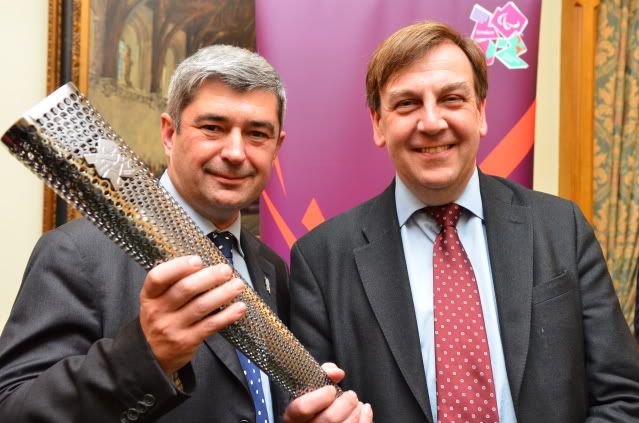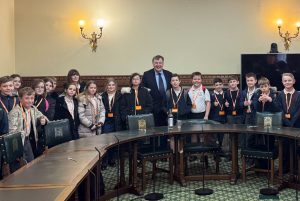
John Whittingdale with Members of the House of Commons Select Committee on a recent visit to the Olympic Park.
It is now nearly seven years since the day on which it was declared that London would be the host city for the 2012 Olympic and Paralympic games, and I suspect that almost everyone will remember where they were and their reaction when the news was announced.
It was undoubtedly fantastic news for Britain, and it was rightly celebrated, but I think that quite a lot of us also thought, “Oh dear, what do we do next?” One of the things that the Culture, Media and Sport Select Committee, which I chair, decided to do was to hold regular sessions to monitor and scrutinise the work being done to prepare for the greatest sporting event that this country has held. Over the past seven years we have held annual sessions with the chairmen and chief executives of the Olympic Delivery Authority and the London Organising Committee of the Olympic Games and Paralympic Games and with the Secretary of State for Culture, Media and Sport—first Tessa Jowell and now my right hon. Friend Mr Hunt.
It is worth observing at this point that one of the striking things about the policy towards and preparation for the Olympics is that not only did London’s bid enjoy cross-party support from the start, but in all the time since it was announced as the host city, despite occasional, small differences across the Chamber, which were inevitable, in the main both parties have worked well together. Certainly, I believe that my party did what it could to support the right hon. Member for Dulwich and West Norwood when she was Secretary of State, and since then she has worked with us to ensure that the preparations go ahead smoothly and are not marred by partisanship or political point scoring.
We are now only 151 days away from the start of the games, so it seems an opportune moment to debate the progress that has been made and how close we now are and to focus, in particular, on what we hope to achieve by hosting them. Inevitably, attention initially focused very much on questions of funding and how we would afford to pay for the games. Indeed, there was some anxiety about whether we could finish the work in time for the games—something that has caused concern for previous host cities.
There was always a degree of controversy about the extent to which the financing of the facilities would have to be met out of national lottery funding, and the impact that that would have on the lottery’s ability to fund projects in the rest of the country. We were always very clear that if the lottery was to meet a substantial part of the bill for hosting the Olympics, it would inevitably be less able to fund a lot of worthwhile projects elsewhere, and that some causes would therefore not get the funding that they otherwise deserved. For that reason, we expressed the hope that should the contingency not be fully spent, it could be given back to the national lottery. As it transpires, that will not be possible.
I still very much hope that even though the National Audit Office has expressed concern, the funding package will prove just about sufficient to meet all the costs. I am sure the Minister will want to say a few words about that if he is fortunate enough to catch your eye, Mr Speaker. I believe it is fair to say that it will be very tight. The NAO’s last estimate identified a residual risk of something between £127 million and £999 million, with the most likely risk being £318 million, to be met out of the remaining contingency of £354 million. That would leave 0.39% of the budget unspent, so I am afraid the national lottery will not get much from that source.
The Committee identified that future receipts from land sales could be used to compensate the national lottery, and the Government included such a provision in the funding agreement. That is still intended, I hope, to raise £675 million. Perfectly understandably, the Minister is reluctant to give a firm guarantee about that, given the uncertainty about the price of land, but I hope he shares my hope that that can be achieved. It has rightly been said that legacy is the most important issue facing us. In the course of the Committee’s monitoring of preparations, we have visited a number of previous Olympic cities. In the past seven years, we have been to Athens, Barcelona, Seoul, Munich and Beijing, and have talked to the organisers of the Sydney and Los Angeles games. It is fair to say that none has achieved a successful, lasting legacy.

Pictured with Cllr Castle of Essex County Council and the Paralympic torch
Some cities have achieved some aspects, but the challenge for London was always to succeed where other cities had not. The first challenge, which is obviously of interest to Lyn Brown, is on the facilities in east London. The Secretary of State told the House recently that six of the eight facilities now have identified tenants and uses, which leaves two. They are the two that have proved the most difficult—the stadium and the media centre. I suspect that we cannot yet say any more about how those two facilities should be used, but obviously the stadium is an extraordinarily expensive facility, and it is important that it is not just used for the Olympics and Paralympics and that we find future uses for it. All the members of the Committee who went to Athens and saw the grass growing out of the tarmac in the Olympic stadium came back determined to avoid such a thing here. I hope that the Minister will talk about that.
The other issue, which my hon. Friend the Member for Gillingham and Rainham rightly raised, is the harder task of creating a sporting legacy. Seb Coe, when he originally made the pitch, concentrated on the need to use the Olympics to inspire young people across the country to want to take up sport. The Government have not sustained the 1 million target, but nevertheless I welcome the Places People Play programme and the extra funding given to it.
We are most anxious that when young people, watching inspirational sportsmen winning medals in whatever discipline on the television, think, “I’d like to take up that sport”, they should find it easy to do so. It is terribly important that we support local sports clubs, schools and sporting facilities right across the country, so that those facilities are there and we can get that immediate benefit from the inspiration that the games will undoubtedly bring to people.
I will quickly touch on three areas that my hon. Friends the Members for Gainsborough (Mr Leigh) and for Cities of London and Westminster (Mark Field), in particular, have mentioned. As I suggested to my hon. Friend the Member for Gainsborough, ticketing was always going to be difficult. LOCOG could either have pitched ticket prices at such a level that anyone who wanted one would have been likely to get one, in which case it would have been criticised for setting prices too high, or it could have done what it did, which was to set prices at such a level that they were within the reach of most people, but as was entirely predictable, I suppose, demand massively outstripped supply.
I do not want to spend a great deal more time speaking. I shall merely note the two big challenges, which have already been raised. The first is security, which we have talked about at some length. Obviously the climate has changed since the original budget was set, but the issue will always be a matter of some concern, and I am sure that the Minister will want to say something about it.
The second challenge is transport, which I know has occupied the attention of the Government; indeed, it has also caused some concern to the Committee. Even if we achieve the target of reducing journeys on the part of commuters and businesses by 20% on the busiest days—asking people to change their habits to that extent is quite a demanding target—that will still, we are told, lead to half-hour delays in getting on tube trains at certain stations. That is a measure of the difficulty that the issue has caused.
Indeed, if there is one issue that is causing the most anxiety to those responsible for preparing for the games, it is transport, so I am sure that the Minister will want to say a bit more about it. The Select Committee has inevitably concentrated on the areas of concern. We have identified where we think there could be problems and I hope we have done so in a way that has allowed them to be tackled. However, I congratulate the right hon. Member for Dulwich and West Norwood and her party, the right hon. Member for Bath—whom I could not leave out—and my colleagues on the Front Bench on the work that they have all done.
In particular, I also congratulate both the Olympic Delivery Authority, which has done a fantastic job in building such world-class facilities on time and, we hope, within budget, and LOCOG, whose main job is still ahead, but which has nevertheless done a huge amount of impressive work. I look forward to the rest of the debate, but I will look forward even more to a fantastic games in July and August.


